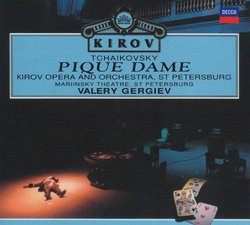| All Artists: Pyotr Il'yich Tchaikovsky, Valery Gergiev, Kirov Chorus and Orchestra, Gegam Grigorian, Maria Gulegina, Olga Borodina Title: Pique Dame Members Wishing: 0 Total Copies: 0 Label: Philips Release Date: 11/16/1993 Genre: Classical Style: Opera & Classical Vocal Number of Discs: 3 SwapaCD Credits: 3 UPC: 028943814126 |
Search - Pyotr Il'yich Tchaikovsky, Valery Gergiev, Kirov Chorus and Orchestra :: Pique Dame
 | Pyotr Il'yich Tchaikovsky, Valery Gergiev, Kirov Chorus and Orchestra Pique Dame Genre: Classical
The Queen of Spades was the opera that won Tchaikovsky the most popular acclaim in his lifetime, and with good reason. It's a powerfully dramatic story that offered the composer some irresistible opportunities. The Rococo ... more » |
Larger Image |
CD DetailsSynopsis
Amazon.com essential recording The Queen of Spades was the opera that won Tchaikovsky the most popular acclaim in his lifetime, and with good reason. It's a powerfully dramatic story that offered the composer some irresistible opportunities. The Rococo setting encouraged Tchaikovsky to have a lot of fun in writing fake classical period dance and vocal music. But into this light-hearted and elegant atmosphere, the story itself presents the darkest possible picture of pathological obsession--with sex, gambling, money--all those juicy items that great opera seems best able to express. Tchaikovsky certainly rose to the occasion, and so does this excellent performance. With a superb all-Russian cast, it's without question the one to have. --David Hurwitz Similarly Requested CDs
|
CD ReviewsThere Is Another Choice wellio@wa.freei.net | Seattle | 04/08/2000 (5 out of 5 stars) "See previous review! I wanted to extend my review to include a comparison with another GREAT Russian recording of Pique Dame- the 1974 Bolshoi recording with Mark Ermler at the helm. This was my first Pique Dame, purchased in 1999...before I knew about this one!Anyways- these are both fantastic recordings and quite different. When I first got this one (Kirov) it took me a while to get used to it. Amazon says he "attacks" the score. I don't think so- not in comparision to Ermler. The slower more elegant Kirov speeds and vocals took more time to get used to.Kirov singing- definitely superior, but surprisingly I prefer the Bolshoi's Pauline, Galina Borisova to Olga Borodina... Borisova ATTACKS her part, which seems to make sense. Borodina sings very slowly and more gracefully and certainly has better tone- but sometimes that isn't enough. I also like Vladimir Valaitis as Count Tomsky better than Putilin. Valaitis and Borisova are teamed up for the great ACT II Duet as in Ermler's version Pauline (Borisova) sings the part of Milovzor in "Kak ty mila" in ACT II, whereas Kirov has Gulegina (Liza)singing that part. Interesting change.The Ermler set is more driven, louder, and seems more "Tchaikovsky" than this set- however this set is so beautiful---it really has the beauty where the Ermler set sometimes lacks, and the Ermler set has the excitement the Gergiev set at times lacks- however sometimes Gergiev kicks it in- then LOOK OUT!It's a tough call... I would say the Kirov is slightly better, but there is another option out there, if you can find it- Ermler is hard to find now because of Gergiev's popularity!" A magnificant recording of a magnificant opera! gellio | San Francisco, CA | 03/30/2000 (5 out of 5 stars) "We all are familiar with Tchaikovsky's ballets, his wonderful symphonies, and his time worn 1812 Overture, which he himself called "bombastic." However, few of us are fimilar with the composers operas, particularily Pique Dame (The Queen of Spades) and Eugene Onegin.Eugene Onegin snagged itself a permanent place in the repitoire a long time ago- but it was slow coming for Pique Dame.For me, the two greatest things in opera are: 1) Mozart, and 2) Russian opera. Pique Dame offers the best of both world's here. Tchaikovsky's favorite operas where Mozart's "Don Giovanni" and Bizet's "Carmen." The man had great taste. The influence of Bizet and Mozart shines through in Pique Dame, yet the opera still maintains the Russian tradition of big chorus' and big/rich/lavish score, yet this is certainly a "classical opera." The score is incredible and this cast is the best- unbeatable combination.Act II (my favorite act) is simply phenomenal. Borodina is entirely unforgettable as Pauline..and this cast as a whole is stupendous. There is nothing like real Russian's singing a real Russian masterpiece.Pique Dame shines so much it is much preferred (by me) to that of Eugene Onegin- which is fantastic in its own right.Both Pique Dame, Eugene Onegin, and even the overlooked Mazeppa should be in every opera lovers collection.Wonderful! Simply Wonderful!" An Excellent Queen of Spades D. A Wend | Buffalo Grove, IL USA | 08/13/2004 (5 out of 5 stars) "It is interesting that Pique Dame was first offered to Tchaikovsky's pupil Nikolay Klenovsky by Ivan Vsevolozhsky (who was a force in the composition of The Sleeping Beauty). Had it not been for the pupil's vacillation, Pushkin's story may never have been taken up by the composer. Modest Tchaikovsky had written a libretto for Klenovsky and made some changes for his brother, who composed the music in white heat and had completed the project in 5 months. Pique Dame was premiered at the Maryiinsky Theater on December 19, 1890 to great acclaim. The opera made its progress through Europe and within a decade had been performed at every major house.
There are not many recordings of Pique Dame but of them, this one is arguably the best for the energy of the performance and the quality of the singers. The Kirov Orchestra is superb, and they are recorded with great clarity. Valery Gergiev's conducting is outstanding and he produces a well-nuanced recording of Tchaikovsky's melodrama. The singers are well cast: Gregam Grigorian is an excellent Herman, particularly in his aria at the end of act 1 scene 1 when he declares he will get the secret of the three cards. I have had the pleasure of seeing Maria Guleghina singing different roles (most notably a thrilling Tosca) and always look forward to her performances. In this recording, she sings beautifully and her duets with Olga Borodina, who sings the role of Pauline, are particularly memorable for the nice blending of their voices. In the third act, Ms. Guleghina has some problems in scene 2 hitting her notes and her voice is somewhat stressed. I did not find that she has the heavy vibrato noted by another reviewer. Irina Arkhipova makes an excellent Countess and the supporting cast members are excellent. This is an excellent recording that anyone interested in Russian opera will find of interest. " |

 Track Listings (21) - Disc #1
Track Listings (21) - Disc #1






